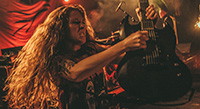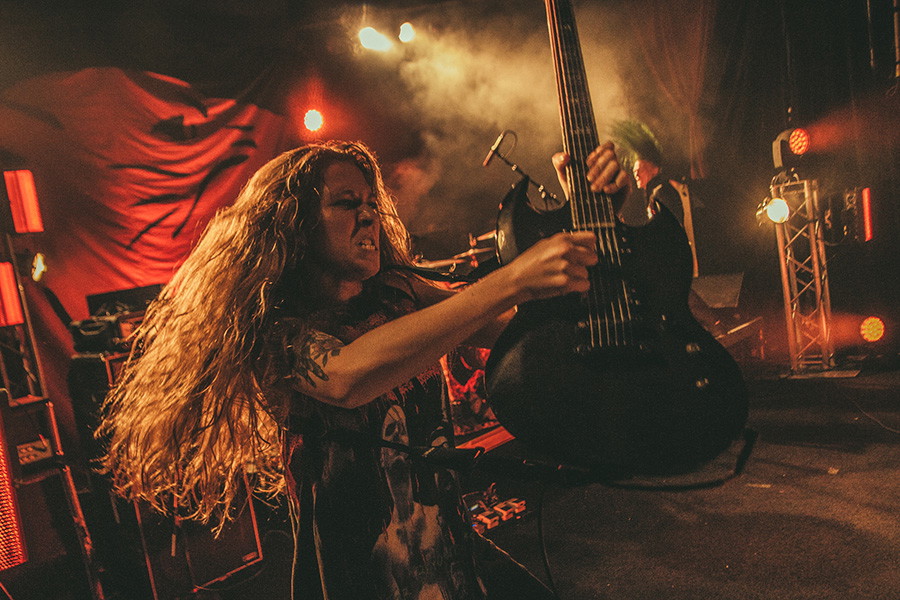Artist Spotlight: Reba Meyers (Code Orange)
Artist Spotlight: Reba Meyers (Code Orange)


Photo by Justin Boyd
With a 2018 Grammy nomination for “Best Metal Performance” and a hit album under their belt with Forever, you’d think that Code Orange guitarist/singer Reba Meyers would have started resting on her laurels already. But when you talk to her, you understand that this musician still feels she has a long way to go to reach her peak. After almost non-stop touring for years, we finally had a chance to chat with this talented player, songwriter, and live performer.
Let’s start with your background as a musician. When did you get started?
I started when I was a little kid, playing music at school. I first picked up a guitar when I was 12 or 13. That’s when I met Jami (Morgan, Code Orange drummer/vocalist), and we got into punk together. I actually started out on bass and then switched to guitar later.
What was the appeal of being a musician?
I originally just played for fun. It was fun for me to learn songs and going through the process of learning stuff on my own. The things is, with this band, we were never good at playing other people’s stuff. That’s why we started writing our own songs right away.
So, we started the band when I was 13 or 14, and I was playing bass. I then switched over to guitar a couple years later and have no regrets.
Tell us the story of getting your LTD Deluxe Viper-1000.
I’d switched over to guitar from bass out of necessity. We’d had another guitarist in the band and they left, so someone had to handle those guitar parts. Growing up as I did, as a kid, even having one instrument was a big deal. I already had a bass and this tiny 4x12 combo amp which cost me my all my savings.
So when I switched to guitar, I had no idea what to do and no plan, but luckily I had a friend who was in another band called Failure to Fall who helped me out, They were a local band from Pittsburgh and I loved them, and that was his guitar. I’d noticed that when he played the Viper in that band, it’s hard to describe, but it always sounded really smooth and super heavy at the same time. He filled in for us for a couple weeks, and then passed that guitar along to me.

Photo by Jake Owens
Were there other things that were specifically appealing about the Viper?
One thing is that it was different. I really hated Strat-style guitar bodies at the time. Every jerk at school had a Strat, it seemed. So I saw that guitar and it just looked cool and different to me.
How did you end up owning it?
My friend said, “I’ll sell it to you but charge you in installments,” because I definitely could not have just bought it outright. I paid him once a month until I paid it off. So, it wasn’t anything about the Viper in particular at that time. I was just psyched to have a guitar at all.
Lots of guitarists, ESP players and otherwise, mod their guitars in various ways to make it better to their individual tastes. I saw that you changed out the stock EMGs that were in your Viper-1000. What are you using instead?
I’m using Railhammers right now. They’re great. Railhammer was a small company out of Ohio that recently linked up completely with Reverend guitars. They hit us up early on and wanted to help, so I tried them out and love them. Obviously, so many people have the the stock EMG and ESP combination. It’s a great sound. I only switched them out because I wanted my sound to be more personal.
You use a variety of tones in Code Orange, from super high gain noise to crunchy riffs to clean and spacey progressions. I know you use a lot of effects to achieve various sounds, but has the Viper been versatile in regard to giving you what you want tone-wise?
Yeah, definitely. What I find is that you write music that becomes tailored to what you have. When I play the Viper, I always make it work. It’s totally about how you play on a certain guitar. Since I’ve grown up and literally learned to play guitar on it, I know how hard or how soft to play to get what I need. I can make it work for everything, and I play it on 90% of our songs, so I’d say it works pretty damn well.
Code Orange has done a ton of touring over the past couple of years. How has the guitar held up on the road?
I would say pretty good, considering I’ve been playing it for 10 straight years. There are always little things that happen over time, whether it be slamming my pickups out of place or knocking off tuning pegs, but as far as the guitar itself, I haven’t had any real issues, and for a band that tours around the world eight months out of the year, I’d say it’s definitely durable.
Onstage with Code Orange, your stage presence is just completely ferocious, and I see how that energizes your audience and feeds that energy back to the band. It’s not like you have a bunch of projections and lasers and pyro-
Not yet.
No, not yet. But you’ve been doing that with just your music and your vibe onstage. Where does that come from?
As we grew up with the band, it connected with us personally. Early on, we knew we weren’t very good musically, but we did have passion for it. When you start from a young age, you really learn what makes you, you.
Then after touring for so many years, you learn what connects with people. It’s not like solving a math problem. It’s what you feel that connects with people. You can study other bands, their music and stage shows and videos, but you would never be good just doing that. You need a personal investment and the time to develop your personal style as a performer. It’s not just copying what other bands are physically doing. We’ve been doing it so long now that we found our own lane. When I was a kid, there was no one who was doing exactly what I’m doing. I wasn’t a metal kid. I knew there were woman guitar players out there, but all I knew and cared about was punk and hardcore. To me, it was about just doing whatever I wanted, whatever popped into my head. As I got older, I learned to control everything.
When I started out, I was introverted.
What? Really? “Introverted” is definitely not the word that comes to mind when I see you play live.
I’d get on stage and see the audience and would feel like, “I don’t know anyone out there. I don’t want to look at them.” So as a band, we’d go hard to each other, and that taught us to then connect in that way with the audience. In that way, we flipped it. We learned how to work and play off of each other’s energy as a unit, and that led us to really create a more confident performance later on.

Photo by Jamie C. Langley
A lot of guitar players go through many models before they find the one that’s perfect for them. Have you even tried other ESP models beyond your Viper?
Our other guitar player had an EC Series, and I tried it, but I wasn’t into it. People do ask me all the time, “Why do you still play that guitar?” and it’s because I found the one that works for me. Living where we live, it’s not like everything is available to us, and I hate the idea of walking into a guitar store and just trying other guitars out. When we went to record with Kurt (Ballou, Code Orange producer), we’d try out a bunch of guitars, but it always came to my guitar with my pickups in it. It’s the best guitar for me and my playing style. I feel fortunate. Considering the way I got the Viper, it could have been anything. It could have been a piece of junk, but it wasn’t. It was just luck that I got it in the first place, and then I grew into it.
I know that you all share composition duties as a band, but I find your guitar parts in particular to be super interesting, with lots of dissonance, really cool rhythmic variety and more. You seem to go out of your way to avoid playing cliche-driven guitar lines. How did you develop your abilities as a music composer?
It’s hard to say. I’ve thought about it. “Why do I play the way I play?” It’s so hard to narrow down the inner works.
One thing was how I grew up, listening to the music I did and playing music so young. A lot of it depends on why you listen, and your own connection to that music. For me, I listen so much because I really love it. I hear certain dissonant melodies, or beautiful melodies, and they stick with me. Certain things stick in your brain, and you won’t consciously realize why they’re there. Also I think most really good guitarists have a sense of what they want to hear before they play it. If you have an idea of a melody, and can play it with your fingers and you get that flow, you do your best work that you could ever do. The more you play and the more you learn, you can just go.
And of course there are times that you get stuck, like everyone does. But with all that music in your subconscious, and when you have a real passion for it, it speaks for itself. Growing up, we come from a small culture of weird music. We were always looking for bands that no one knows about. All of those bands were underrated but great. One band was never enough. We listened to thousands of records. It was always what we cared about more than anything. It’s not like you have to actually study the music to become capable of creating your own, though a lot of people do just that. We don’t. We learn by ear and let it soak into us.
Sometimes that’s a great way to find new ideas. Not actually learning someone else’s song completely, but just catching a little bit of it and letting whatever vibe you picked up affect what you’re working on.
Yep. When I’m a little stuck, I’ll listen to 5-10 seconds of a song, and get inspired again.
You’re playing an LTD guitar, which price-wise represents the more affordable area of what ESP offers. Is it important to you to be playing a guitar that’s accessible to lots of the kids who come see Code Orange?
It’s so important from my perspective now. It’s not why I started playing that guitar at all, but it’s a nice bonus. it’s something that I started to care about more recently, now that I actually see that there are people who look up and see a chick playing guitar and they want to do that too.
There are kids coming up to me and asking about what I play. It makes me angry that people think that because they don’t have money, they can’t play. Kids get frustrated. But with a guitar like this, a kid could totally save up the money and get it. So yeah, now it’s very important to me. Guitar is not supposed to be about “Who has the nicest instrument?” It’s the kids who struggle the most are the ones who become great. When you’re starting out, you feel like a joke surrounded by all these shitty bands who have all this nice gear. If you find something that works for you, it doesn’t have to be perfect.
I’m not going to ask you about being a female player in metal. What I’d like to know is, from your perspective, what can ESP be doing as a guitar manufacturer to help bring in more young women to the world of guitar-driven music?
Well, it’s a tough question, and I’m not an expert on that sort of thing. From my knowledge of it, most of the work isn’t on the company. It’s more about social constructs, and how people react to the idea of women in metal.
One thing ESP has already done right is involving me in their roster. As far as we’re concerned, we’re one of the smaller fish on the roster. But when someone goes to the ESP site and looks who the artists are, they see Code Orange, and it isn’t necessarily a conscious thought, but helps start the process to make it more in the norm to see a woman guitar player in heavy band, representing a heavy guitar company. It’s not just a matter of working with bands who happen to have women either. What it’s about is finding bands with women who can help lead and inspire others, and be looked up to in a positive way. Not just fly-by-night bands, that won’t have lasting effects.
The second thing is the marketing... the way guitars are marketed are primarily geared toward men. When you see ads for guitars, especially metal-style guitars, you never even see women. And if you do, a lot of times it feels like a ploy just to create more revenue, and not a genuine intention to be inclusive. It’s a tough line, but in the end, do what you can to let people know that guitar isn’t just for men, or just for any one kind of person. It’s frustrating that it has to be this way, so little things companies do can help. But it has to be real. Musicians can see when a company seems to be trying so hard to pretend to support women. Fuck them. These companies need to showcase women leaders in guitar who can be role models, and have a uniqueness that shows kids that they can be whoever they want as a guitar player.
Are you still making efforts to learn and grow as a guitarist and as a songwriter?
Yes. I would be a horrible person if I said no to that question. That’s like my #1 thing. I have no reason to say I’ve got it down now and can’t get better. I actually feel like I’m horrible at guitar. I’m always trying to grow by writing more songs, listing to more music, finding creative ways to play, and making more sounds. I’ve noticed that while working with Code Orange, it’s harder to play songs from the new album than songs from the previous album. It’s more than just being more familiar with the songs. We’re purposefully writing them to be a little harder to play so I can push my abilities.
If you want to write better songs, you have to get better at your instrument. I’m always looking at other guitarists and how they play. I always try, even subconsciously, to take little things here and there and build my arsenal. As a guitar player, if you want to write good riffs, it’s going to take a lot of different ideas and different ways of playing things. There are a lot of bands who get one good riff, and they write a demo and it’s great, but after that they’re bone dry. It take many, many, many good riffs to sustain a career. You have to stay on your toes and do new things with the instrument.
Is it important for musicians to get exposure to types of music outside their comfort zone?
I would say yes, as long as you like the music. Every person is different and they have to figure out what works for them. For me, going out of my comfort zone is important, finding different tricks, looking everywhere, as long as I truly like the music. If I’m trying to get outside my box but don’t like the music, there’s no point. You can try to find as many things as you can that connects with you, and it’s always good to look outside the box, but try asking people in your scene, in your musical community, and finding new things that way. Don’t just get on the Internet and accept what you find. I am always searching for new stuff while being aware that heavy music is always going to be my thing.
Keep up with Code Orange at their web site.
If you want to achieve certain successes, then you need to make certain efforts as in music. It is difficult not to read more and not to study when in the 21st century there is such a great opportunity to do this. You always need to achieve your goals.







